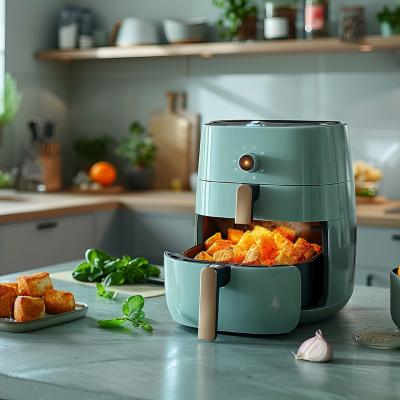
Millions of people use gas stoves every day to cook in their homes, and many use portable gas stoves for cooking on camping trips. Gas is a very flammable fuel. So, can a gas stove explode?
Yes, a gas stove can explode. Whenever gas is involved, there is always a risk of a gas explosion. However, the risk of a gas stove exploding is generally very small as long as you understand how to properly use the stove and have taken the appropriate precautions.
What causes a gas stove to explode? (and how to prevent it)
A gas stove is a fairly simple piece of equipment, meaning there aren’t too many things that can go wrong—however, the consequences of faulty gas stoves or gas lines can be disastrous. Here’s what can cause a gas stove to explode:
1. Leaks
When a gas stove is in use, gas continuously flows from underground pipes or a gas cylinder which is then ignited to produce a steady flame. If your stove is leaking, gas is able to escape into your home, and this could cause an explosion.
To prevent leaks, you must ensure your stove is properly installed and maintained (more on that in no. 4). Gas has a pungent smell—so if gas is leaking into your home, you should be able to smell it but to be safer, you should be using a gas leak detector device.
Good ventilation—such as using an extractor fan or simply opening a window—prevents so much leaking gas from building up in your home. However, your main priority should be stopping leaks from occurring in the first place.
2. Accidentally leaving the gas on
Many gas stove owners have done this on occasion. Perhaps you turn the gas on and then realize you don’t have a match or lighter on hand to spark to the gas, and you walk away from the stove that is still emitting un-ignited gas.
Some modern stoves have safety features that turn off the gas if the burner is not lit after a few seconds, but many gas stoves do not have this feature. Be very vigilant in ensuring you never leave the gas on accidentally. Make sure the knob of your stove is set to the “off” position when not in use. You can also listen closely to hear the sound of escaping gas.
3. Damaged gas lines or cylinders
While incidents related to faulty underground gas lines are rare, they still occur on varying scales worldwide. Gas cylinders (if your stove uses one instead of being connected to underground lines) can also pose a threat if damaged.
It isn’t much you can do to monitor the state of gas lines around your home (they are underground after all) except to speak to your local authority to ensure they are being properly maintained.
If you are using a gas cylinder, however, this responsibility is yours. Gas cylinders have a lifespan somewhere between 5-15 years, and they must be tested by technicians every few years. If you are unsure if your gas cylinder is fit for purpose, exchange it for a new one with your cylinder merchant.
4. Improper installation
If your stove is connected to the gas supply incorrectly, it’s possible for a build-up of pressure to occur which could lead to an explosion.
Most countries have regulations that require registered engineers to install a gas stove and/or sign off on the installation being safe. Never attempt to install or otherwise work on a gas stove if you aren’t qualified.
5. A build-up of residue
Residue, including grease and dust, can build up on the stove and in your stove’s ventilation. This can create a fire hazard.
Clean your stove and any ventilation apparatus regularly with a degreaser. You can also hire a professional to clean inside your stove’s vent which may be difficult for you to do yourself.
6. Overheating
Yes, stoves can overheat. If a stove gets too hot, it can cause a gas leak. One of the most common causes of stoves overheating is a faulty knob which makes you think it’s on a lower setting than it really is.
Make sure the flames of your gas stove are never too large and watch for indications that the stove is too hot such as scorch marks or melted plastic.
What else can I do to prevent a gas stove accident?
Besides watching out for the common causes of gas explosions mentioned above, there are some other preventative measures you can take when using gas stoves.
- Get a gas leak detector and a carbon monoxide detector. These alarms let you know there is a gas leak or high levels of carbon monoxide in your home before it becomes too dangerous.
- Don’t leave anything combustible around your stove. These materials could include dishtowels and oven mitts but also appliances like microwaves.
- Clean your stove with a non-flammable cleaner.
- Never leave your stove on and unattended.
- Fix your stove to the wall. This prevents the stove from tipping over—particularly important if children are in the home.
- Always check the gas is fully off before walking away.
- Regularly clean your stove.
- Ensure your stove has good ventilation to the outside, and never cover vents.
- If you’re in the market for a new stove, buy a stove with automatic gas shutoff valves and a re-ignition feature that relights the stove if the flame goes out.
- Have your gas stove serviced at least annually?
What should I do if my gas stove explodes?
If despite all your efforts you are ever unlucky enough to experience a gas stove explosion, you should immediately leave the area and call the emergency services number. Try to alert neighbors or anyone in the vicinity that they need to evacuate by loudly shouting “fire!” but don’t put yourself in danger by reentering the building.
Final thoughts
Can a gas stove explode? Yes, although the chance of this happening is small. Any kind of stove—whether gas, electric, wood-burning, etc.—poses some degree of risk. Fires and explosions are something you should always be vigilant about, particularly when using a gas stove. Gas leaks can easily occur if you are not being careful or maintaining your stove properly.
It’s important you look out for some of the common causes of gas stove explosions as mentioned above and take immediate action to remedy any issues.
If you aren’t sure how to properly maintain your stove, hire a professional to do so. Gas stoves should be evaluated by technicians at a minimum of once a year to check they are safe, and as soon as you notice a potential problem, you should call a repair technician.



